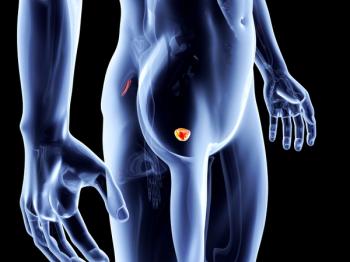
Lower Radiotherapy Dose Shows Promise for Treating HPV-Related Oropharyngeal Cancer
Given the current study findings, investigators suggested intratherapy personalization of chemoradiotherapy may possibly facilitate marked de-escalation of radiotherapy in patients with HPV-related oropharyngeal cancers.
De-escalation of radiotherapy to 30 Gy on the basis of intratreatment hypoxia imaging among patients with head and neck cancers related to human papillomavirus (HPV) infection is feasible, safe, and associated with minimal toxicity, according to a pilot study published in the Journal of the National Cancer Institute.1
Patients with HPV-related oropharyngeal cancers typically have good outcomes but experience clinically significant toxicities when treated with standard chemoradiotherapy at a dose of 70 Gy. Given the current study findings, investigators suggested intratherapy personalization of chemoradiotherapy may possibly facilitate marked de-escalation of radiotherapy.
“This is an absolute game changer for treating HPV-positive cancer,” lead author Nancy Lee, MD, a radiation oncologist at Memorial Sloan Kettering Cancer Center, said in a press release.2 “The difference in toxicity is dramatic compared with standard radiation therapy.”
In this study, investigators used pre- and intratreatment dynamic fluorine-18–labeled fluoromisonidazole PET to evaluate tumor hypoxia in 19 patients. Patients without hypoxia at baseline or intratreatment received 30 Gy of chemoradiotherapy, and those with persistent hypoxia received 70 Gy. Of note, neck dissection was conducted at 4 months among de-escalated patients to determine pathologic response.
“Reducing the radiation dose to 30 Gy for HPV-positive head and neck cancer seemed feasible because HPV-positive anal cancer has been treated effectively with that dosage,” added Lee.
Overall, 15 of 19 patients had no hypoxia on baseline PET or resolution on intratreatment PET and were deescalated to 30 Gy. Of these patients, 11 had a pathologic complete response.
Two-year locoregional control was 94.4% (95% CI, 84.4%-100%) and overall survival was 94.7% (95% CI, 85.2%-100%). No acute grade 3 radiation-related toxicities were observed.
“It’s hard to describe the huge difference this makes,” first author Nadeem Riaz, MD, MSc, radiation oncologist at Memorial Sloan Kettering Cancer Center, said in the release. “With the 7-week treatment, patients typically lose 20 to 30 pounds and may have to go on work disability for several months. When receiving the smaller dose over just 3 weeks, they have almost no radiation side effects. It’s like you’re not even using the same treatment.”
On serial imaging, microenvironmental features were found to have correlated better with pathologic response than tumor burden metrics or circulating plasma cell-free DNA. Further, a whole genome sequencing–based DNA repair defect was associated with response (P =.02) and was reproduced in an independent cohort (P =.03).
Notably, the success of the current study has led to the development of a Precision Radiotherapy Program at Memorial Sloan Kettering Cancer Center. This new program is intended to develop similar studies aimed at making radiation treatments more personalized for each patient’s cancer, regardless of its location.
“Radiation therapy has proven to be one of the most effective cancer treatments,” Simon N. Powell, MD, PhD, FRCP, radiation oncologist and chair of the Department of Radiation Oncology at Memorial Sloan Kettering Cancer Center, said in the release. “The ultimate goal of our initiative is to make radiation therapy a targeted treatment based on the biology of the tumor and the characteristics of the patients.”
References:
1. Riaz N, Sherman E, Pei X, et al. Precision radiotherapy: reduction in radiation for oropharyngeal cancer in the 30 ROC trial. JNCI: Jour Nat Cancer Inst. Published online January 12, 2021. doi: 10.1093/jnci/djaa184
2. Low-dose radiation a possible “game changer” for treating HPV-positive throat cancer. News release. Memorial Sloan Kettering Cancer Center. Published January 25, 2021. Accessed February 19, 2021. https://www.mskcc.org/news/low-dose-radiation-possible-game-changer-treating-hpv-positive-head-and-neck
Newsletter
Stay up to date on recent advances in the multidisciplinary approach to cancer.














































